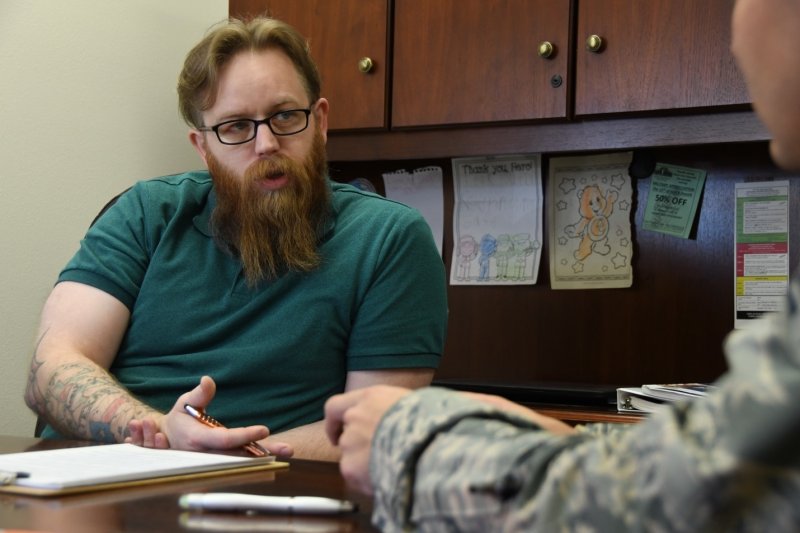Ryan Lynn, a Veterans Affairs veterans benefits advisor, talks with an Airman about retirement benefits are available to him. Lynn provides service members, family members and veterans, assistance and a better understanding of the benefits they are entitled to once they retire. Photo by Airman 1st Class Nilsa E. Garcia/U.S. Air Force
Jan. 2 (UPI) -- Veterans risk their lives in service to their country -- and yet, they worry about their health, health care, when they return home.
According to a survey published Thursday in the American Journal of Preventive Medicine, most veterans in the months after leaving military service are less satisfied with their health than with their work or social relationships.
That may be because the majority of them were dealing with chronic physical health conditions and a third reported chronic mental health conditions after coming back to the United States, researchers say.
"What remains to be seen is whether those veterans with health conditions -- which were more commonly experienced by deployed veterans -- continue to maintain high levels of well-being in other life domains over time," Dawne Vogt, of the VA Boston Healthcare System, said in a statement. Vogt is the lead author of the article reporting on the survey.
"Given that it is well-established that health problems can erode functioning in other life domains, it may be that these individuals experience declines in their broader well-being over time," she added.
More than 200,000 U.S. service members transition out of military service annually, according to figures from the VA -- and the first few months following their return home are seen as a critical time to address challenges they may face in readjusting to civilian life.
Historically, support for veterans leaving the military has focused on providing employment and educational assistance and informing veterans of their benefits.
However, Vogt said, the findings of the current study suggest that veterans' health concerns should be prioritized. Interventions should also target at-risk subgroups of veterans, she added.
For their study, Vogt and her colleagues surveyed almost 10,000 veterans who left the military in the fall of 2016. Veterans were surveyed about three months after leaving active duty, and then six months after that.
At both three and nine months after leaving the military, 53 percent of respondents said they had chronic physical health conditions, and about 33 percent reported chronic mental health conditions at both time points. The most commonly reported health conditions were chronic pain, sleep problems, anxiety and depression, the authors noted.
In addition, just over half of respondents said they had reduced satisfaction with their health between when they first left the military and a few months later. Notably, health satisfaction did not change much between three and nine months after leaving the military.
Male veterans were more likely to report hearing conditions, high blood pressure and high cholesterol, while women leaving active duty were more likely to cite mental health conditions -- depression and anxiety -- at nine months post-separation.
Overall, enlisted veterans showed consistently poorer health, vocational and social well-being than officers, while veterans who had deployed to a war zone had more health concerns than veterans who did not deploy.
Conversely, the majority of respondents said they were satisfied with their work and social relationships and that they were functioning well in these areas.
More than 75 percent of participants reported that they were in an intimate relationship in the months after they left the military, and almost two-thirds said that they had regular contact with their friends and family and that they were involved in their broader communities.
Over half of participants had found work within three months after leaving the military. However, while most participants reported high work satisfaction, the study group showed an overall decline in work functioning over the first year.
According to Vogt, the fact that most participants had high work and social satisfaction "highlights the resilience of the veteran population, and should provide some reassurance to those concerned about the well-being of newly separated veterans."
She and her colleagues also found that male veterans were more likely to be employed than female veterans both three and nine months after leaving the service.
Vogt noted that these findings may help programs designed to assist veterans with readjustment decide how to allocate their resources, perhaps with a greater focus on the overall well-being of retired servicemembers.
"Given that most transition support is targeted to veterans with the most acute or chronic concerns, this recommendation may require rethinking how veteran programs prioritize their efforts," she said. "While it makes sense to target resources to those with greatest need, it is better to support individuals before their concerns become chronic when we can."















